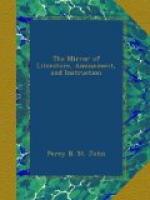* * * * *
ENGLISH WOMEN.
Nothing could be more easy than to prove, in the reflected light of our literature, that from the period of our Revolution to the present time, the education of women has improved among us, as much, at least, as that of men. Unquestionably that advancement has been greater within the last fifty years, than during any previous period of equal length; and it may even be doubted whether the modern rage of our fair countrywomen for universal acquirement has not already been carried to a height injurious to the attainment of excellence in the more important branches of literary information.
But in every age since that of Charles II, Englishwomen have been better educated than their mothers. For much of this progress we are indebted to Addison. Since the Spectator set the example, a great part of our lighter literature, unlike that of the preceding age, has been addressed to the sexes in common: whatever language could shock the ear of woman, whatever sentiment could sully her purity of thought, has been gradually expunged from the far greater and better portion of our works of imagination and taste; and it is this growing refinement and delicacy of expression, throughout the last century, which prove, as much as any thing, the increasing number of female readers, and the increasing homage which has been paid to the better feelings of their sex.
* * * * *
Mr. Lee, the high-constable of Westminster, in the Police Report, says, “I have known the time when I have seen the regular thieves watching Drummonds’ house, looking out for persons coming out: and the widening of the pavement of the streets has, I think, done a great deal of good. With respect to pick-pocketing, there is not a chance of their doing now as they used to do. If a man attempts to pick a pocket, it is ten to one if he is not seen, which was not the case formerly.”
* * * * *
CRIME IN PARIS.
Vidocq, in his Memoires, relates, that in 1817, with twelve agents or subordinate officers, he effected in Paris the number of arrests which he thus enumerates:—
Assassins or murderers
15
Robbers or burglars
5
Ditto with false keys
108
Ditto in furnished houses
12
Highwaymen
126
Pickpockets and cutpurses
73
Shoplifters
17
Receivers of stolen property
38
Fugitives from the prisons
14
Tried galley-slaves, having left their
exile 43
Forgers, cheats, swindlers, &c.
46
Vagabonds, robbers returned to Paris
229
By mandates from his excellency
46
Captures and seizures of stolen property
39
——
811




